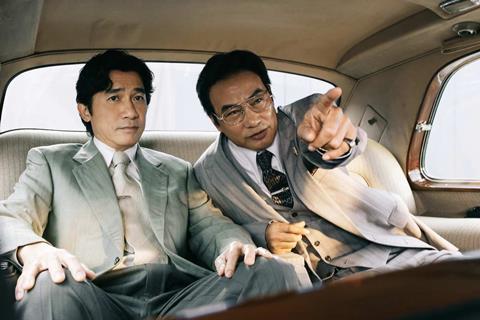‘Infernal Affairs’ duo Tony Leung and Andy Lau re-team for a rip-roaring tale of corruption and greed

Dir. Felix Chong. Hong Kong. 2023. 125 mins
Twenty years after they fatefully circled each other in the iconic thriller Infernal Affairs (2002), Tony Leung and Andy Lau finally reunite in Felix Chong’s corruption saga The Goldfinger. It’s inspired by the rise and fall of the Carrian Group, a Hong Kong conglomerate that grew exponentially in the early 1980s only to collapse amid allegations of fraud and the murder of a bank auditor. In landing Leung to play a thinly-veiled version of Carrian Group founder George Tan and Lau as the investigator who devotes ten years to bringing the figurehead to justice, Chong has pulled off the kind of casting coup that stokes expectations.
An eminently watchable take on limitless greed in late colonial Hong Kong
The Goldfinger should be taken on its own terms, yet it’s impossible to ignore how it echoes and inverts Infernal Affairs, which Chong also co-wrote. Andrew Lau and Alan Mak’s metaphoric noir was conceived when Hong Kong cinema was at a low-ebb due to industry uncertainty following the Mainland China handover. Budgeted at $45 million, a record for a Hong Kong production, The Goldfinger arrives when local output is again dwindling so its commercial performance will be similarly watched. That said, the two films are decidedly different beasts. As suggested by its swaggering title, The Goldfinger is as splashy as Infernal Affairs was stealthy. The pivot to white-collar crime takes events from the streets to luxurious penthouses, while Leung and Lau’s roles find the actors trading positions on the moral spectrum.
Opening in Hong Kong on December 30 and internationally in early January, The Goldfinger is a glossy tentpole which will ring up healthy returns in Asian markets. Its biggest selling point is the re-teaming of Leung and Lau, which should also attract a fair turnout for the overseas theatrical run. It’s unlikely that The Goldfinger will emulate Infernal Affairs by embedding itself in global film culture, but its sheer star power guarantees robust streaming revenues down the line.
The film starts in the early 1970s with penniless Chinese businessman Ching Yat-yin (Leung) arriving in Hong Kong via cargo ship in search of a fresh start. Floundering as an engineer, Ching finds his calling when he helps real estate developer Tsang Kim-kiu (Simon Yam) close a deal by posing as a cash-flush entrepreneur to put pressure on a hesitant potential buyer.
From there, Ching rapidly builds an empire under the banner of the Carmen Group. By the early 1980s, he is synonymous with the Hong Kong economy and deemed a master of investing (in fact, stock manipulation). However, when a small stock market crash points to irregularities, senior Independent Commission Against Corruption (ICAC) investigator Lau Kai-yuen (Lau) aims to prosecute Ching. Unfortunately, key figures in the case keep disappearing in suspicious circumstances.
The Goldfinger could be described as American Gangster (2007) without the violence, or The Wolf Of Wall Street (2013) minus the debauchery. These broad comparisons are also indicative of how Chong wavers in his approach to the film’s enigmatic subject. A scene in which Ching picks up his business cards after they have been discarded by the (mostly British) guests at a swanky social gathering positions him as a class warrior; yet he’s soon revelling in the spoils and throwing lavish parties of his own, including one that brazenly riffs on James Bond title sequences with models dancing in glass boxes. As legal pressures mount, however, Ching evolves into a cut-throat gangster capitalist.
Leaning into his evergreen charisma, Tony Leung effortlessly takes the audience along for the ride, but is ultimately only able to craft a fractured portrait. As his nemesis, Andy Lau is tasked with making a paragon of virtue interesting and his measured under-playing is commendable. When the two stars square off, their contrasting acting styles give the verbal sparring a real crackle. The well-chosen supporting cast gets less room to shine, although there is a terrific turn from Charlene Choi as Ching’s feisty secretary turned Carmen Group chairman.
As a film concerned with the power of perception, The Goldfinger largely succeeds as a style exercise. Eric Lam’s meticulous production design transports the audience into the upper echelons of Hong Kong society with no expense spared on the snazzy trappings. Fuelled by Day Tai’s up-tempo score, there is an almost a musical quality to the giddy take on high stakes wheeler dealing with Ching crowd-surfing on stock brokers and dancers performing a showstopping routine in a boardroom to celebrate a business deal. Although contrast is provided by the plainly lit offices and drab interrogation rooms of the ICAC or glimpses of Lau’s humble family life, it starts to feel rather artificial after a while since this is a largely interior depiction of the era with relatively little sense of Hong Kong beyond the privileged world of the elite.
Chong largely structures the decades-spanning narrative in accordance with Ching’s philosophy that “the plot goes where the money flows,” but the director’s penchant for jumping back and forth in time means that The Goldfinger is almost as convoluted as his underwhelming caper Project Gutenberg (2018). As such, it’s not always clear which year we’re witnessing and one of the most interesting elements (Ching’s shadowy business connections in Southeast Asia) gets rammed into the final act. It still adds up to an eminently watchable take on limitless greed in late colonial Hong Kong, albeit one that promises more than it delivers considering the talent involved.
Production company: Emperor Motion Pictures
International sales: Emperor Motion Pictures, project.inquiry@emperorgroup.com
Producer: Ronald Wong
Screenplay: Felix Chong
Editing: William Chang, Curran Pang
Cinematography: Anthony Pun
Music: Day Tai
Main cast: Tony Leung, Andy Lau, Charlene Choi, Simon Yam, Carlos Chan, Alex Fong, Michael Ning, Philip Keung, Tai Bo
























No comments yet